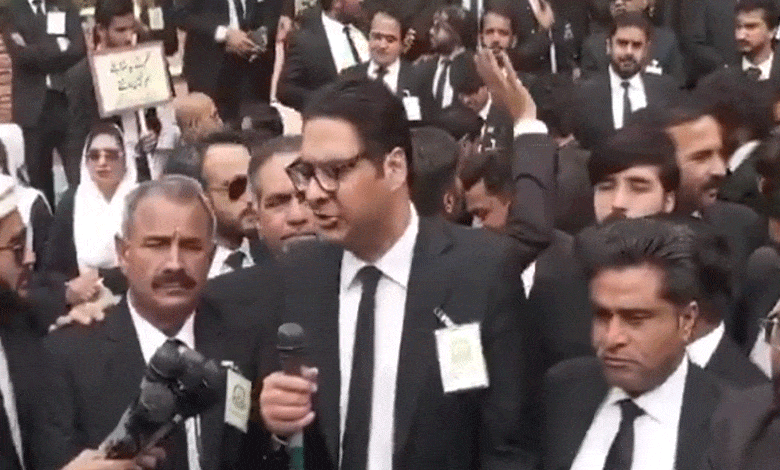Massive Lawyer Protest Disrupts Islamabad Over Supreme Court Judges’ Appointment
Islamabad was thrown into turmoil on Monday as lawyers took to the streets in a massive protest against a meeting at the Supreme Court, where the Judicial Commission of Pakistan (JCP) was set to finalize the names of eight High Court judges for elevation to the Supreme Court.

Islamabad was thrown into turmoil on Monday as lawyers took to the streets in a massive protest against a meeting at the Supreme Court, where the Judicial Commission of Pakistan (JCP) was set to finalize the names of eight High Court judges for elevation to the Supreme Court. The protestors raised concerns over the potential appointments and the recent controversial transfers of judges, causing widespread disruption in the capital.
Table of Contents
Lawyers Oppose Judges’ Appointment and Judicial Transfers
The proposed elevation of eight High Court judges to the Supreme Court sparked strong opposition from multiple quarters, including some sitting judges and thousands of lawyers. Legal organizations in Islamabad have also voiced their discontent with the recent transfers of five judges to the Islamabad High Court (IHC), accusing the government of attempting to divide the judiciary.
The lawyers have called the 26th Constitutional Amendment “completely unacceptable” and demand that the JCP meeting be postponed. They argue that the proposed judicial moves would undermine the independence and integrity of the judiciary.
Protests and Security Clampdown in Islamabad
The protest led to chaos in Islamabad, with large crowds of lawyers gathered outside the Supreme Court, chanting slogans in support of judicial freedom. The Islamabad police responded by blocking several key roads leading to the Supreme Court and the Red Zone area, as well as deploying additional security forces to manage the situation. Metro bus services between Islamabad and Rawalpindi were also suspended due to the protests, leading to significant inconvenience for commuters.
Controversial Judge Transfers Spark Further Tensions
One of the most contentious issues at the heart of the protests is the recent transfer of Justice Sarfaraz Dogar from the Lahore High Court (LHC) to the IHC. His subsequent recommendation for elevation to the Supreme Court has sparked outrage, particularly after two Islamabad High Court judges raised questions over the transfer and recommendation. The protesting lawyers argue that these moves threaten the judiciary’s dignity and independence.
Also Read: AI Could Free Us or Replace Us: Bill Gates Sounds Off on the Technology’s Dangerous Path
Call for Postponement of JCP Meeting
Despite the growing protests, the Judicial Commission of Pakistan decided to move forward with its meeting to finalize the appointments. The decision to proceed with the meeting, despite strong opposition, has intensified the protests. Lawyers have vowed to continue their demonstrations, calling the JCP’s actions a “dangerous attempt” to weaken Pakistan’s judiciary.
The Lahore High Court Bar Association (LCBA) also submitted an application to the Supreme Court, requesting the postponement of the JCP meeting until a decision is made regarding a petition challenging the 26th Constitutional Amendment.

A Growing Movement Against Judicial Reforms
As the protests continue to unfold, the legal community in Pakistan remains deeply divided over the judicial reforms and transfers, with many arguing that these moves could have far-reaching implications for the country’s legal and judicial framework. Lawyers are determined to prevent any decisions they perceive as attacks on the judiciary’s independence and integrity, with further protests expected in the coming days.
